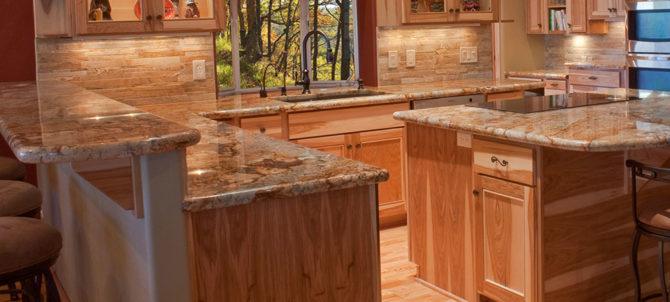
When building or remodeling your kitchen, one of the most significant decisions you’ll make is the countertop material to install.
This is because they influence the place’s visual and general mood and may also be the catalyst for developing a good cooking plan.
If you choose the wrong kitchen countertops, you’ll most certainly wind up with culinary nightmares, and you don’t want this, do you?
To ensure that you choose the right material, you need to consider several tips:
Ease of maintenance
Maintenance is one of the most crucial factors when selecting a worktop material for your kitchen.
If you prefer a pristine environment, you want a surface you can easily wipe.
One of the best materials to go for is Quartz. This is because it’s easy to care for and highly durable.
Quartz is made out of quartz stone particles mixed with resin. Since quartz surfaces are resilient and non-porous, they are less prone to discoloration, so cleaning oil, coffee, or juice is as simple as one swipe.
Quartz is also available in many nature-inspired patterns and gorgeous colors.
If you don’t like Quartz, you can always go for porcelain countertops highly resistant to heat and chemicals. They are also resistant to acidic or alkaline materials and will not fade or discolor over time.
The surfaces are also easy to clean, saving you a lot of time and effort.
If you cook a lot at home, go for solid surface countertops.
These countertops are non-porous and resistant to stains and bacteria since they are made of hard polyester, acrylic, and resin.
Solid surfaces are also highly durable and do not need to be regularly sealed.
And, if they develop dents, you can easily buff out most of the scratches.
Cleaning up spills is a breeze, as most solid surfaces can be cleaned with a bit of soap or simple home cleaning.
Because a solid surface is not heat resistant, you should be ultra-cautious of hot pots and dishes and use a trivet to protect them.
Heat resistance
The kitchen has high temperatures, so the ideal kitchen countertop should be heat-resistant unless you are looking for a countertop that you must keep replacing.
One of the countertop materials you can go for is porcelain. Porcelain can tolerate extremely high temperatures since it is comprised of clay and burned at high temperatures.
Other heat-resistant countertops you can consider include Quartz, granite, and marble.
While they are less likely to be harmed by hot pans and trays than other surfaces, it is wise to be ultra cautious and use trivets or cooling racks.
Some surfaces, even virtually shatterproof, can crack unexpectedly when subjected to severe heat, so always protect them.
Hygiene
Many people rarely think about their countertops’ hygiene status, which is wrong. You should always consider how your chosen countertops will impact your food upon installation.
Few materials outperform copper in hygiene, so always consider it during installation. Copper and its alloys, such as bronze, brass, and copper-nickel, are naturally antibacterial, so bacteria and viruses that settle on their surface are quickly killed.
When you undertake regular surface cleaning, brass and copper kitchen counters make an excellent choice and provide you with the extra infection protection you are after.
Because brass and copper have living finishes, their appearance will vary and develop with time, yielding amazing effects.
Although these kitchen counters can be sealed with lacquer to preserve a uniform appearance and avoid discoloration, it’s important to note that doing so will counteract the material’s natural antibacterial characteristics, so it’s good to leave them in their original look.
If you don’t like brass and copper, a reasonable rule of thumb to follow when choosing countertops is that the less porous the material is, the more hygienic it is.
A non-porous texture prohibits the growth of bacteria, mold, or mildew, ensuring optimum cleanliness.
Ease of kneading on them
If you enjoy baking or preparing pizza and pasta, you’ll want a smooth, non-porous countertop that keeps a low temperature even when things get hot.
Quartz is one of the best materials to consider. We already know it is non-porous, stain-resistant, low-maintenance, and easy to clean – all unquestionably important when dealing with a lot of flour.
But what makes Quartz particularly appealing is its ability to sustain a low temperature, and as all pastry cooks know, temperature counts.
Quartz countertops keep their cool, so you can, too, since there will be no melting butter, sticky dough, or collapsed flaky crusts.
Ease of cleaning
Cleaning the countertops is part of maintaining them, and ensuring you can easily clean your surfaces is important.
How easily you clean these surfaces depends on the material you have installed.
If you have Quartz countertops, the non-porous, sealed surface requires less upkeep than other stone surfaces. To clean it, dampen a towel with mild dish soap and warm water or use a quartz cleaner, then dry it with a clean microfiber cloth.
For granite countertops Raleigh, avoid leaving spills on them for extended periods, as they may develop stains or discoloration due to their porous nature.
To clean the granite surfaces, use a moist cloth dampened with mild dish soap and warm water or a granite cleaner, then dry with a clean microfiber towel. Resealing your countertops once or twice a year is also wise to prevent watermarks and stains.
When it comes to marble countertops, you should know that it is susceptible to stains and scratches. You should reseal these countertops at least once or twice a year.
If you like the look of marble but do a lot of cooking or baking, or drink coffee or red wine, avoid going for natural marble, as it will make it hard to keep it clean. Instead, it would be best to go for marble-looking Quartz that will give you the same look, but you have less chance of harming or staining your counters.